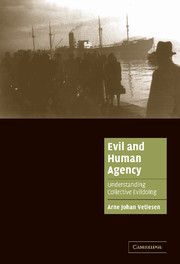Book contents
- Frontmatter
- Contents
- Preface
- A note on the cover image
- Introduction
- 1 The ordinariness of modern evildoers: a critique of Zygmunt Bauman's Modernity and the Holocaust
- 2 Hannah Arendt on conscience and the ‘banality’ of evil
- 3 The psycho-logic of wanting to hurt others: An assessment of C. Fred Alford's work on evil
- 4 The logic and practice of collective evil: ‘ethnic cleansing’ in Bosnia
- 5 Responses to collective evil
- 6 A political postscript: globalization and the discontents of the self
- References
- Index
- Evil and human agency
2 - Hannah Arendt on conscience and the ‘banality’ of evil
Published online by Cambridge University Press: 10 December 2009
- Frontmatter
- Contents
- Preface
- A note on the cover image
- Introduction
- 1 The ordinariness of modern evildoers: a critique of Zygmunt Bauman's Modernity and the Holocaust
- 2 Hannah Arendt on conscience and the ‘banality’ of evil
- 3 The psycho-logic of wanting to hurt others: An assessment of C. Fred Alford's work on evil
- 4 The logic and practice of collective evil: ‘ethnic cleansing’ in Bosnia
- 5 Responses to collective evil
- 6 A political postscript: globalization and the discontents of the self
- References
- Index
- Evil and human agency
Summary
Introduction
Although there exists a vast literature dealing with Hannah Arendt's thoughts on evil, few attempts have been made to assess Arendt's position on evil by tracing its connection with her reflections on conscience. In this chapter, I set out to examine the significance of such a connection.
Conscience does not figure among the topics for which Arendt's work is most known. One searches in vain for an essay or book of hers devoted to it. To present-day readers, Arendt is associated first of all with the notion ‘the banality of evil’, coined in her book Eichmann in Jerusalem (1965a). Arendt's struggle to come to terms, philosophically if not morally, with Eichmann and his kind of (doing rather than being) evil, forced her to consider again and again the interrelation between thinking, willing, and judgment, on the one hand, and evildoing, on the other. Her undertaking was to see how much light philosophy – meaning thinking as such, not the academic discipline – can throw on evil.
So what about conscience? As I said, conscience is no salient topic in Arendt. However, this is not the whole truth. As soon as one starts to trace Arendt's reflections on evil in her oeuvre, one finds that she from early on explored a connection now overshadowed by the aforementioned one between thinking and evil – namely, a connection between conscience and evil.
- Type
- Chapter
- Information
- Evil and Human AgencyUnderstanding Collective Evildoing, pp. 52 - 103Publisher: Cambridge University PressPrint publication year: 2005

